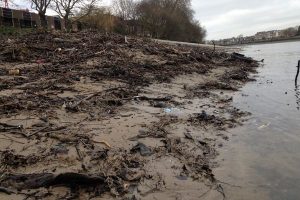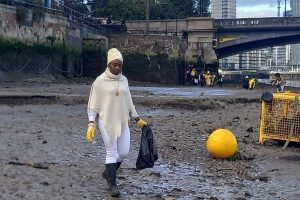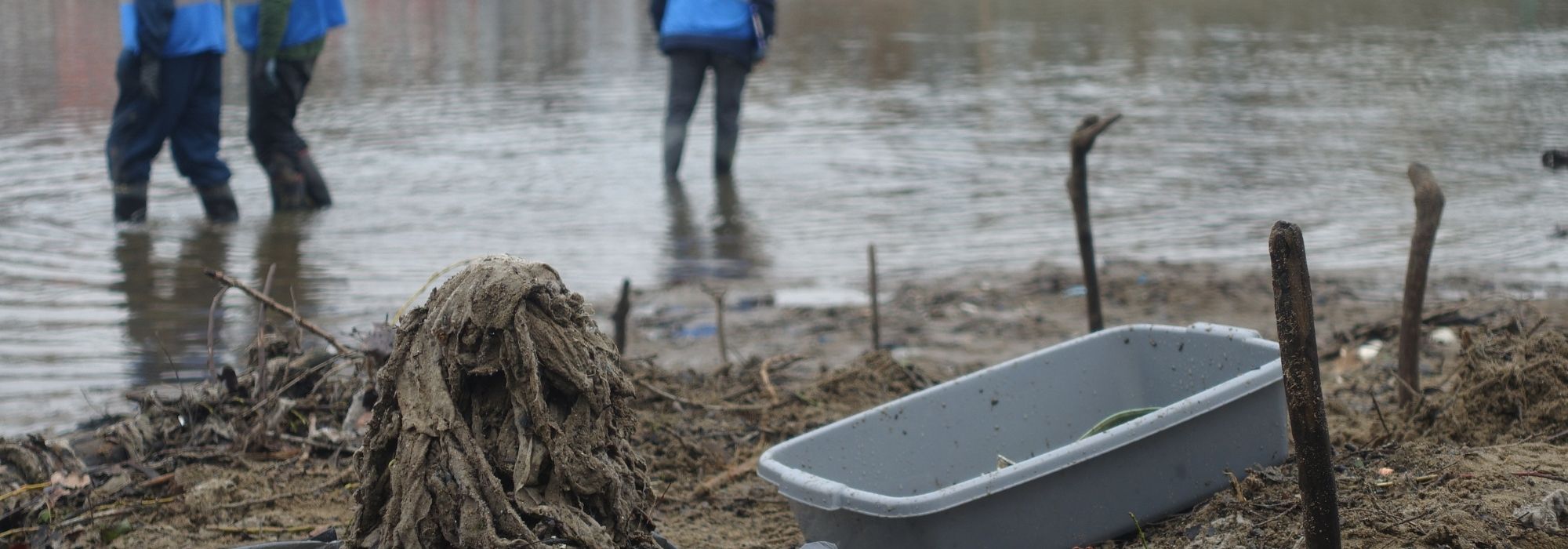Taking action against plastic in wet wipes to protect our rivers
Our charity has striven to protect and transform the River Thames and its tributaries since 1994. We are not stopping in that task.
In fact, our main purpose is to see the health of our rivers and their habitats improve to support wildlife and human life, and connect communities to our rivers.
The problem
However, the River Thames and its tributaries are suffering a plague of wet wipes.
Of the 11 billion of these disposable wipes sold each year in Britain, an estimated 2.5 billion are wrongly flushed down the lavatories.
 The principal problem is that 90% of wet wipes, even some labelled “flushable”, are made with plastics that do not break up like tissue paper when flushed. Pollutants such as wet wipes mount up on the foreshores of slow-moving parts of the river after sewage overflows dump them into the water. Wet wipes enter rivers, snagging on twigs and rocks on the foreshore before natural sediments glue them together. Over a period of six years (2017-2023), Thames21 has collected more than 135,000 wet wipes from the Thames foreshore. We no longer want to see these items blighting our local environment.
The principal problem is that 90% of wet wipes, even some labelled “flushable”, are made with plastics that do not break up like tissue paper when flushed. Pollutants such as wet wipes mount up on the foreshores of slow-moving parts of the river after sewage overflows dump them into the water. Wet wipes enter rivers, snagging on twigs and rocks on the foreshore before natural sediments glue them together. Over a period of six years (2017-2023), Thames21 has collected more than 135,000 wet wipes from the Thames foreshore. We no longer want to see these items blighting our local environment.
CEO Chris Coode said: “Wet wipes made with plastic fibres are contaminating our rivers and building up in large numbers on the River Thames foreshore, and the plastic is forming ‘wet wipe islands’ which are devastating for wildlife and for people. Many fish in the river have plastic fibres clogging up their digestive systems. The situation is only getting worse.”
The solution
We believe this is a serious issue and we are calling for a ban on the sale of all wet wipes containing plastic. If plastic in wet wipes are banned this will lead to less pollution in our rivers. This is because wet wipes with plastic in them can cause blockages which back up sewage that spill into our rivers.
We believe in a multi-stakeholder approach.
Manufacturers and retailers must create innovative plastic-free alternatives that don’t cause as many blockages and improve labelling so that they are playing a role in educating the public about how to dispose of wet wipes.
Water companies must invest further in our sewage infrastructure so that it relies less on sewage overflows and install more screens to prevent wet wipes entering the environment;
Consumers need to dispose of their wet wipes correctly; bin it don’t flush it! Only the 3 Ps (pee, poo and paper) should be flushed down the toilet.
And we hope the government brings in a ban of plastic in wet wipes as a top priority to stop this plague of wet wipes damaging the Thames.
The government consultation on the proposed ban for plastic in wet wipes is now closed. We officially submitted our response to the Department for Environment, Food and Rural Affairs in November 2023.
We are keeping our fingers crossed that the government will ban plastic in wet wipes after analysing the responses by February 2024.
If we are serious about reducing irrecoverable plastic waste in the natural environment, we must ban plastic in wet wipes IMMEDIATELY!
What you can do
 Politicians of all parties are starting to wake up to the need to ban plastic in wet wipes. Please write to your MP to stress the point.
Politicians of all parties are starting to wake up to the need to ban plastic in wet wipes. Please write to your MP to stress the point.
We are calling on the government to ban plastic in wet wipes because of the damaging impact on the Thames and because of the accumulative impact of microplastics in ocean.
We await the results of the government’s consultation and expect to see an announcement in early 2024.
In November 2023, we provided example responses for our supporters to copy, edit and paste as guidance. Please click on highlighted link here to find Thames21’s response to government’s consultation on banning plastic in wet wipes.
